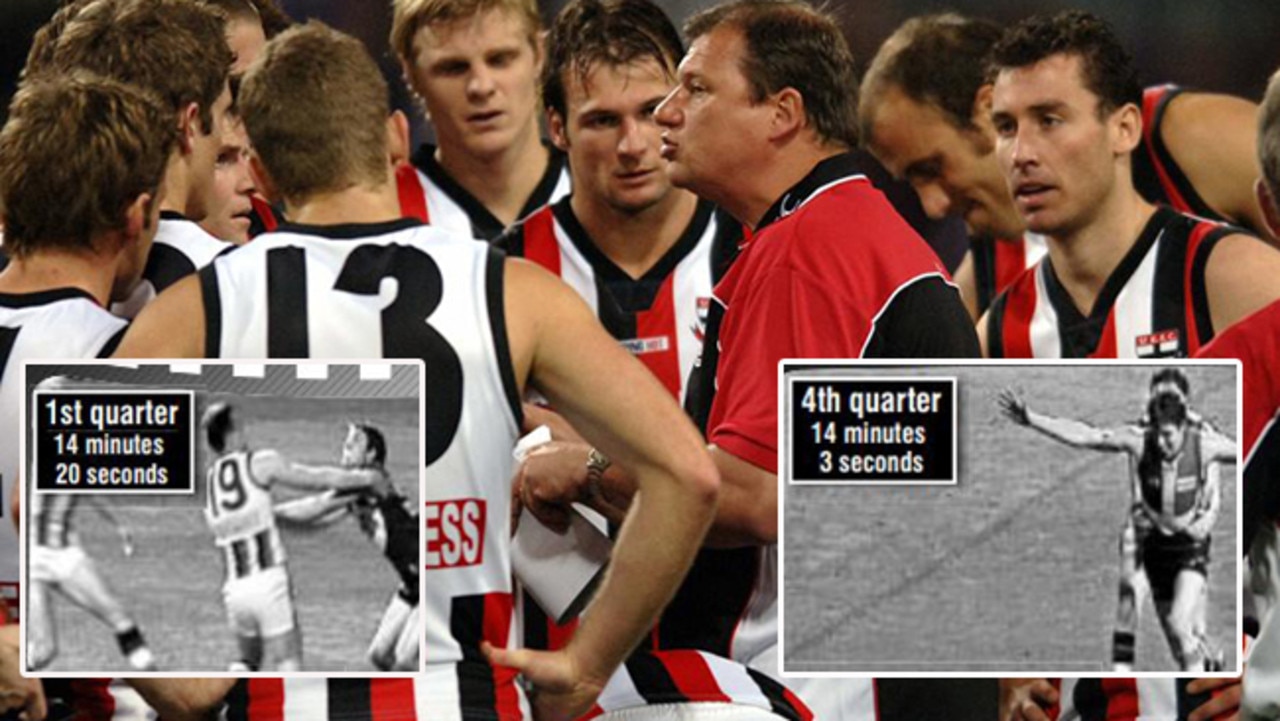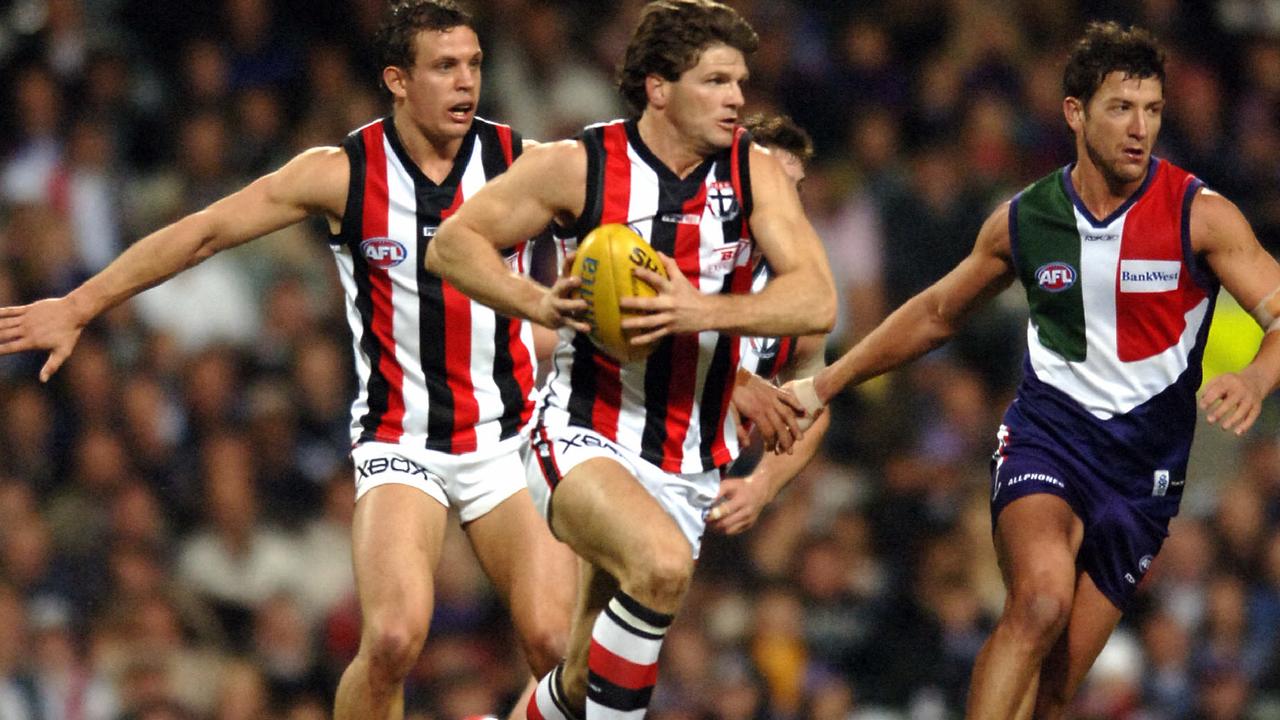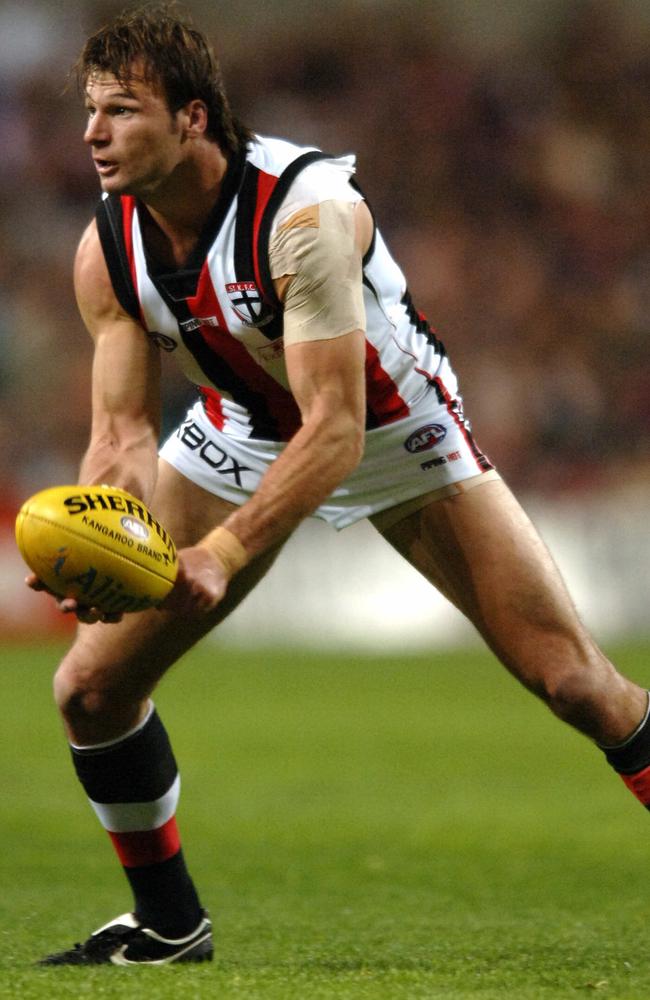Whispers in the Sky AFL game: The umpire decisions that haunted St Kilda
It was highly controversial and remains so to this day. Fremantle came from behind to beat St Kilda by five points with a goal after the siren. Here are the contentious moments that made history.

It was highly controversial and remains so to this day. Back in August 2005 Fremantle came from behind to beat St Kilda by five points after Justin Longmuir took a mark with seconds left in the match and then kicked a goal after the siren.
Numerous contentious free kicks in the match had angered Saints fans and the anger was intensified by the subsequent “Whispers in the Sky” controversy.
Below is the account Jon Ralph wrote not long after the match in which he ran the rule over the contentious decisions....
CLICK HERE TO SUBSCRIBE TO THE ‘SACKED’ PODCAST
Grant Thomas says umpires over-officiate and pull lineball decisions from their ‘‘you-know-where’’.
Sam Newman says they are often pretentious and pedantic.
After 10 of the last 12 goals in last week’s St Kilda Kangaroos game were decided by free kicks, it is hard to argue with either of them.
With that in mind, JON RALPH rules a line through every one of the 33 decisions.
This week the AFL will hit Grant Thomas with the mother of all fines, but the football gods conspired to give him a taste of purgatory against Fremantle.
READ MORE
>> ONBOARD THE FLIGHT THAT SPARKED CHEATING SCANDAL
>> THOMAS: TRUTH ABOUT MY ROLE IN BLIGHT’S SACKING
>> TIMELINE: HOW ‘WHISPERS IN THE SKY SAGA’ UNFOLDED
On a night when the heat was on AFL umpires like never before, the three officials — Brett Allen, Matthew Head and Derek Woodcock — combined to award 33 decisions, 15 of them in favour of the Saints.
They did so much right for the night. But of the five decisions that might be judged lineball or even wrong, four of them resulted in direct goals to Fremantle, a killer punch in a game in which the Dockers could cobble together only 12 goals.

Thomas argues that the greater evil is to pick out an unnecessary free kick, more so than to ignore the marginal decisions.
It proved again the flaw in the AFL’s argument that 85 per cent of decisions are found to be correct when they are reviewed.
For huge chunks of Friday night’s game the umpires were flawless in their interpretation, communication and even flexibility over borderline decisions. Yet in marking collisions near Fremantle’s goal, they seemed to repeatedly extract the kind of lineball decision they had ignored up field.
Luke McPharlin was the main recipient of the umpires’ generosity — three of his five goals came from free kicks for holding the man, none of them appeared anywhere near as forceful as what Shane Parker did to Fraser Gehrig at the other end of the ground.

The umpires’ night was typified by the second quarter, a superb exhibition of football and umpiring. The umpires let the game flow, the new holding-the-ball interpretation forced players to move the ball on quickly, and any minimal contact was ignored.
Then at the 26-minute mark the Saints were stunned by a holding decision awarded to Matthew Pavlich 10m from goal.
The umpire could claim Matt Maguire had his hands on Pavlich’s hips, but it was incidental at best and the Fremantle star was not even in the marking contest. Had play continued no one — least of all Pavlich — would have taken issue with the decision, but it marred 30 minutes of flawless officiating.
The AFL could argue there was contact in all five Fremantle free kicks that resulted in goals. But the mug punter could claim in every decision bar one that the better verdict was to call play-on.
FIRST QUARTER
Eleven free kicks awarded. Ralph’s rating: seven correct, three marginal, one caused by an incorrect umpiring decision.
The tone seems to have been set early when a free kick is plucked out to Byron Schammer after a robust but fair collision, then Paul Medhurst is penalised for holding the ball despite marking the ball cleanly.
Gehrig is a touch stiff to be judged to have infringed against Parker in a show of strength, then three minutes later Luke Penny holds back McPharlin in a marking contest 20m out from goal.
SUBSCRIBE TO THE SACKED PODCAST

If the standard for consistency is set, no one is telling Gehrig, consistently mauled by Parker all night. Ten minutes later McPharlin gets his second gift free when Brendon Goddard holds him for a split second in a marking contest.
Eddie McGuire suggests Thomas would clear Third World debt with the size of his fine if asked what he thought of the decision. The decision is technically correct, but could easily have been called play-on. Two controversial calls early on signal it could be one of those nights for the umpires.
SECOND QUARTER
Eight free kicks. Ralph’s rating: seven correct, one wrong.
In a ferocious quarter of football, the umpires could not be more judicious. As players pile on the ball, they are given the perfect amount of time to get rid of it, and do so on almost every occasion. Scott Thornton is correctly penalised for a deliberate out of bounds which results in a Justin Peckett goal, and despite repeated crunching collisions the umpires allow the game to proceed without interruption.
Robert Harvey scores a major from a goalmouth scramble where three pairs of players hold each other but none infringe more than their opponent, and St Kilda surges to a 19-point lead.
Then Pavlich goals from what seems a soft Maguire free and again the Saints probably have a right to feel aggrieved.

THIRD QUARTER
Seven free kicks. Ralph’s rating: seven correct.
Again the umpires rise to the occasion. As St Kilda’s injury toll mounts, the umpires pick up incorrect disposals, three correct high tackles, and several illegal marking collisions.
At the 10-minute mark Gehrig collects the ball running away from goal and probably throws it away, but is then scragged again by Parker. The umpire swallows the whistle to his credit.
FOURTH QUARTER
Five free kicks. Ralph’s rating: three correct, two debatable.
The flashpoint arrives at the 14-minute mark, with the hapless Goddard again in the thick of it. McPharlin chases a ball in the forward pocket 40m out, then props as the ball sits in front of him. Goddard grabs his hips and retards him slightly.
Although McPharlin juggles the ball, the umpire quickly penalises the St Kilda player. As the whistle blows Goddard grabs his shorts. The free kick is technically correct, but in a frenzied last quarter when both sides are desperate it could so easily have been overlooked.
McPharlin goals from the pocket and the Dockers surge back into the game. Eight minutes later Goddard is rebounding from the back pocket when run down by Jeff Farmer.
While he has prior opportunity the ball spills immediately free from his hands, a decision the AFL advised pre-season would be called play on.
As Farmer goals to bring the margin back to a point, Thomas can manage only a wry grin as he curses his side’s luck. Eight minutes later Justin Longmuir kicks the sealer and St Kilda trudges off Subiaco a beaten side. Injuries and poor kicking for goal have hurt Thomas’s side, but St Kilda might argue the umpires, too, have played a role.
HOW WE COVERED THE MATCH
We should be dissecting Fraser Gehrig’s five goals, lauding Robert Harvey’s vintage form or marvelling over the second-half duel between tough men Glenn Archer and Aaron Hamill.
But to avoid another aspect of Saturday’s stop-start contest at Telstra Dome would be a disservice to confused players, puzzled coaches and perplexed fans.
Field umpires Matt Stevic, Simon Meredith and Darren Goldspink seemed to take the heritage occasion to heart and reverted to the bad old days of free-kick overload. It wasn’t a matter of whether each of the 50 free kicks was merited.
They probably were. But surely 10 goals coming from free kicks is an inordinate contribution by the umpires to what was a fierce, rather than scrappy, game. From the grandstand, it seemed an over-reaction to Mick Malthouse’s plea a couple of weeks ago to give forwards a fairer go. Several times, spoiling backmen were left confused as to the offence they had just committed and too scared to seek an explanation in case it was interpreted as dissent and attracted a 50m penalty.
This was a much-anticipated third versus fifth match-up that became a stuttering affair with the whistle intervening to stop play, on average, once every two minutes. For goodness sake, let them play. It was set up for an enthralling last quarter with the Kangaroos on the charge, again trying to defy the odds and run down a quality St Kilda unit.
So, what did we get? Officiating to the absolute letter of the law and the anticlimactic situation of five of the last six goals coming from free kicks.
Yes, technically, they might have all been there. But I hadn’t seen such a rash of free shots on goal since poor old Fitzroy was robbed by an overzealous umpire’s whistle in the dying minutes of a game in Adelaide about 10 years ago.

The best umpiring performances are those that have you leaving the stadium wondering who was in charge. Unfortunately, this was a game dominated by umpiring decisions instead of feats from the real entertainers.
Amid the inordinate number of interruptions, the Saints broke open the game with a six-goal second quarter, all from individual contributors, that again underlined how difficult it is to shut down the boys from Moorabbin.
But even the first of that half-dozen bag should never have been paid. Just about everyone, from a protesting Brent Harvey to the fan in the highest perch, could tell you the little Roo got far more than a finger to Stephen Milne’s snap shot from close range in the second minute of the second term.
Look, it didn’t cost the Roos the game. The best team on the day deserved the victory.
Coaches Grant Thomas and Dean Laidley were reluctant to voice concerns about what has become a worrying trend. Our game has more rules than most ball sports anyway and certainly doesn’t need over-officiating.
READ MORE
>> ONBOARD THE FLIGHT THAT SPARKED CHEATING SCANDAL



